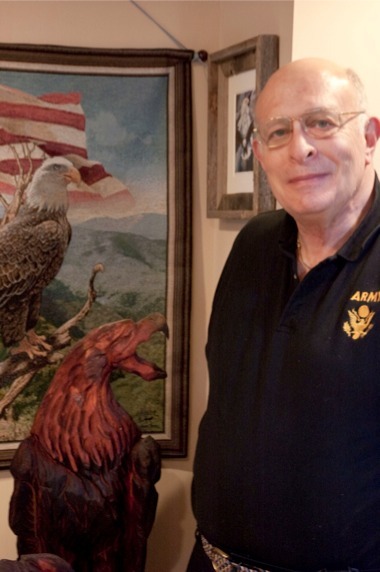SUN CITY – If there’s one thing Gene Klein of Neighborhood 36 knows, it’s how to move something from Point A to Point B, a skill he learned serving in the United States Army Quartermaster Corps in 1967 and 1968, during the Vietnam War.

Sun City resident Gene Klein, N.36, was a First Lieutenant in the United States Army Quartermaster Corps during Vietnam. Trained in logistics, he transported supplies to troops throughout the northern half of South Vietnam. Today, he is the inventor of emergency aid device Survival on a Stick. (Photo by Chris LaPelusa/Sun Day)
Trained in logistics, Klein, a First Lieutenant, was first responsible for moving products and supplies from the United States to Vietnam and then later from the Port of Cam Ranh to wherever supplies were needed throughout the northern part of South Vietnam.
“I moved everything from A to Z, from food to munitions to clothing. Anything that the troops needed,” Klein said.
Klein was in the ROTC in college, and he volunteered to go to Vietnam after graduation. He was committed to the standard tour of 365 days in Vietnam and said that “For one year, I was totally petrified because it was war, and war is not a fun time for anybody. It’s very traumatic, the pressures you are under day in and day out. I would not trade the experience I got in dealing with people or surviving hostile environments for anything, but I would think twice about volunteering to go through it again. You grow up. You come back different. There’s absolutely no question.”
What: Emergency preparedness device that contains important medical, personal, and financial information for times of disaster.
Price: $34.99
How to buy: Visit survivalonastick.com
During his tour of duty, Klein was exposed to Agent Orange, negative effects of which caught up with him in 2002, making him now a service disabled Veteran.
Klein said that the military gave him a career and instilled in him many skills he used throughout his life and career in logistics.
“I take a military approach to problems,” Klein said. “Today, someone says [a product is] on backorder, you’re not going to get it for three weeks. You say, ‘Oh well.’ Well, you can’t tell troops you’re not getting any water or food for three weeks. It just doesn’t work that way.”
In 2005, Klein was living in Houston when he watched the mess of getting much-needed supplies to the victims of Katrina that were stranded among the flooded turmoil of New Orleans unfold. A poorly handled situation that, to a logistics expert, was practically abominable.
“I got very upset. To see, right here in the United States, that they can’t move water from Point A to Point B but CNN could put a truck down there….” Klein said. “It drove me and 15 other professionals to action.”
Thirty days after Katrina, Klein and his partners formed the American Logistics Aid Network (ALAN), which today aids disaster-relief organizations (such as the Red Cross) in transporting supplies to people in areas of disaster around the world.
Three-and-a-half years ago, Klein retired from his career in logistics and from his position with ALAN, but his work continues today with Survival on a Stick, a product of his own invention that was an outgrowth of the poor logistical response to Katrina.
Survival on a Stick is a 1 GB flash drive designed to attach to a keychain and serves as a key element for disaster preparedness.
“People do not have all the necessary paperwork to recreate their lives when disaster strikes,” said Klein, who defined disaster as anything from a house fire to Katrina and anything between.
When SOS is plugged into a computer, a window automatically opens that contains emergency contact information and medical information – such as blood type, allergies, medications, among other pertinent information – so an ER can treat you properly. Another highly encrypted and password-protected area houses important insurance and financial information so that if along with your home, the local insurance and bank branches are also devastated by the same disaster and you’ve been evacuated to a distant location, the respective branches can determine your information to provide you with your money and the necessary information to start your claims.
“What you’ve just done [by having SOS] is gotten in front of all those lines of people standing in there needing help from FEMA,” Klein said. “You now can take care of yourself.”
SOS can also be used to store video downloads of all your possessions for insurance claims, as well as memorabilia like pictures or home movies. SOS was introduced at the 2010 Florida Governor’s Hurricane Conference where it was well received by many national authorities in disaster relief and preparedness.
Klein’s ultimate goal in creating SOS is to fund his not-for-profit company Enlightenment, Inc., which is dedicated to helping United States Veterans in numerous capacities.




